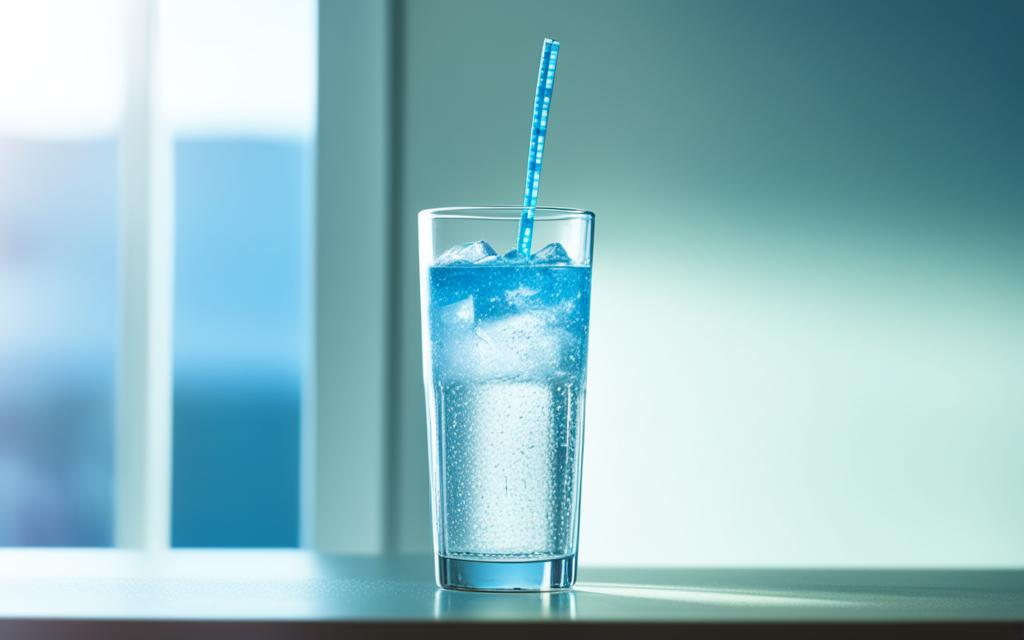Sparkling water, also known as carbonated water, has gained popularity as a refreshing and potentially healthier alternative to sugary sodas. As you embark on your weight-loss journey, you may wonder whether incorporating sparkling water into your diet can be beneficial. This article will explore the potential benefits of sparkling water for weight loss, the differences between sparkling and still water, and provide tips for incorporating this fizzy beverage into your lifestyle. Additionally, we’ll discuss potential drawbacks and considerations to keep in mind when consuming sparkling water.
Understanding Sparkling Water
Sparkling water, also known as carbonated water, is a refreshing beverage that has been infused with carbon dioxide gas, creating a bubbly, effervescent texture. This process, known as carbonation, can be achieved through either natural or artificial means. Naturally carbonated water is often sourced from mineral springs, while artificially carbonated water is produced by injecting carbon dioxide into regular drinking water.
The versatility of sparkling water is evident in the wide range of flavors it can come in, from unflavored to a variety of fruit-infused options. This allows you to tailor your beverage choices to your personal preferences, making it a versatile and enjoyable option to incorporate into your daily routine.
| Type of Sparkling Water | Description |
|---|---|
| Unflavored Sparkling Water | Water that has been carbonated without any added flavors, maintaining a pure, refreshing taste. |
| Fruit-Flavored Sparkling Water | Sparkling water infused with natural fruit flavors, offering a variety of taste experiences. |
| Mineral Sparkling Water | Naturally carbonated water sourced from mineral springs, often containing beneficial minerals. |
Whether you prefer the crisp, clean taste of unflavored sparkling water or the fruity, refreshing notes of flavored options, the world of sparkling water provides a versatile and enjoyable way to stay hydrated and potentially support your weight-loss goals.
Is Sparkling Water Good for Weight Loss?
The potential benefits of sparkling water for weight loss largely stem from its low-calorie and hydrating properties. Compared to sugary sodas, which can be high in calories and added sugars, sparkling water generally contains no calories, making it a more suitable choice for those looking to manage their weight. Additionally, the carbonation in sparkling water may help promote feelings of fullness, potentially leading to reduced calorie intake and supporting your weight-loss goals.
However, it’s important to note that the effectiveness of sparkling water for weight loss can vary depending on your overall dietary and lifestyle habits. While sparkling water can be a helpful tool, it’s crucial to maintain a balanced, calorie-conscious diet and engage in regular physical activity to achieve sustainable weight-loss results.
| Characteristic | Sparkling Water | Soda |
|---|---|---|
| Calorie Content | Generally 0 calories | Can contain 140 calories or more per serving |
| Sugar Content | No added sugars | High in added sugars, often over 30 grams per serving |
| Hydration | Hydrating, as it contains water | Can be dehydrating due to the high sugar content |
As you can see, sparkling water offers several advantages over sugary sodas when it comes to weight management. By providing hydration without the added calories and sugars, sparkling water can be a valuable component of a healthy, balanced diet aimed at achieving and maintaining a healthy weight.
Benefits of Sparkling Water for Weight Loss
Incorporating sparkling water into your weight-loss regimen can offer several benefits that may support your goals. One key advantage is its low-calorie content, especially when compared to sugary sodas and juices. Sparkling water typically contains zero calories, making it a great alternative to high-calorie, sugary drinks that can contribute to weight gain.
Moreover, the carbonation in sparkling water may help promote a feeling of fullness, potentially leading to reduced calorie intake and aiding in weight loss. This carbonation can trigger the release of hormones that signal to your brain that you’ve had enough to eat, potentially curbing your appetite and preventing overeating.
Additionally, sparkling water can be a hydrating beverage option, which is essential for overall health and weight management. Staying well-hydrated can help boost metabolism, support digestion, and reduce feelings of hunger, all of which can contribute to your weight-loss efforts.
Furthermore, the variety of flavored sparkling water options available can make it easier to transition away from sugary drinks and stay hydrated throughout the day. This can be a valuable tool in promoting weight loss by providing a flavorful and satisfying alternative to high-calorie beverages.
Sparkling Water vs. Still Water for Weight Loss
When it comes to weight loss, the choice between sparkling water and still water may come down to personal preference and specific needs. Both sparkling water and still water can offer hydration benefits, but there are some key differences to consider:
| Feature | Sparkling Water | Still Water |
|---|---|---|
| Calories | Generally contains no calories, making it a low-calorie option. | Also contains no calories, providing a calorie-free hydration option. |
| Carbonation | The carbonation in sparkling water may help promote feelings of fullness, potentially leading to reduced calorie intake. | Still water lacks the carbonation, so it may not provide the same appetite-suppressing effects. |
| Hydration | Some studies suggest that the carbonation in sparkling water may not be as hydrating as still water, as the bubbles can cause the water to be absorbed more slowly. | Still water is generally considered more hydrating, as it is absorbed more quickly by the body. |
| Acidity | The carbonation in sparkling water can make the water slightly more acidic, which may be a concern for those with sensitive teeth or digestive issues. | Still water does not have the same acidity concerns as sparkling water. |
Ultimately, the choice between sparkling water and still water for weight loss may come down to your personal preferences and specific needs. Both can be beneficial as part of a balanced, healthy lifestyle, but it’s important to consider the potential benefits and drawbacks of each option to determine which one best fits your weight-loss goals.
Tips for Incorporating Sparkling Water into Your Diet
If you’re interested in incorporating sparkling water into your weight-loss journey, here are some tips to help you get started:
-
Replace sugary drinks with sparkling water as a healthier alternative. Swapping out high-calorie, sugary sodas and juices for sparkling water can significantly reduce your calorie intake and support your weight-loss goals.
-
Experiment with different flavors of sparkling water to find your favorites. Many brands offer a wide variety of fruit-infused sparkling water options, allowing you to explore and discover new refreshing beverages that you enjoy.
-
Carry a reusable bottle of sparkling water with you throughout the day. Having sparkling water readily available can encourage you to stay hydrated and reach for a healthy drink instead of reaching for sugary alternatives.
-
Use sparkling water as a mixer in cocktails or mocktails. By mixing sparkling water with fresh fruit or herbs, you can create delightful and low-calorie beverages that satisfy your craving for something fizzy and flavorful.
-
Incorporate sparkling water into your cooking and baking. You can use sparkling water as a substitute for regular water in recipes, adding a refreshing twist to your dishes and baked goods.
By following these tips, you can easily incorporate sparkling water into your diet and enjoy the benefits it can provide for your weight-loss goals.
Potential Drawbacks and Considerations
While sparkling water can be a beneficial addition to a weight-loss plan, there are a few potential downsides of sparkling water that you should be aware of:
| Potential Drawback | Explanation |
|---|---|
| Acidity | The carbonation process in sparkling water can make it slightly more acidic than still water. This acidity can potentially erode tooth enamel over time if not consumed in moderation. |
| Bloating and Gas | The carbon dioxide in sparkling water can cause temporary bloating and gas in some individuals, especially if consumed in large quantities. |
| Sodium Content | Some flavored sparkling waters may contain added sodium, which can be a concern for those watching their salt intake or managing certain health conditions. |
Additionally, it’s important to consider the effects of sparkling water and how it may impact your overall health and hydration. While sparkling water is generally a better choice than sugary sodas, it’s still important to drink it in moderation and as part of a balanced, healthy diet.
If you have any negative effects from sparkling water, such as persistent bloating, digestive issues, or concerns about the acidity, it’s best to consult with your healthcare provider to determine the best course of action for your individual needs.
Sparkling Water and Overall Health
While the potential benefits of sparkling water for weight loss are well-established, this refreshing beverage can also play a role in supporting your overall health and well-being. Let’s explore how sparkling water can affect your hydration and nutrition.
Staying hydrated is essential for optimal health, and sparkling water can be a great way to meet your daily fluid intake. The carbonation in sparkling water can provide a satisfying, bubbly sensation that may encourage you to drink more throughout the day, helping you maintain proper hydration levels.
Unlike sugary sodas, sparkling water does not contain any added sugars or calories, making it a healthier alternative that can contribute to your overall nutritional balance. Additionally, some varieties of sparkling water are infused with essential vitamins and minerals, further enhancing its health benefits.
However, it’s important to note that the acidity of sparkling water can potentially have a negative impact on your dental health if consumed in excess. To mitigate this, it’s recommended to drink sparkling water through a straw and practice good oral hygiene habits.
Overall, incorporating sparkling water into your diet can be a great way to support your overall health and well-being, provided you consume it in moderation and as part of a balanced lifestyle.
Conclusion
In conclusion, sparkling water can be a beneficial addition to your weight-loss plan when consumed as a replacement for high-calorie, sugary beverages. The low-calorie and potentially appetite-suppressing properties of sparkling water make it a suitable alternative that may support your overall weight-loss efforts. Summary of sparkling water for weight loss: sparkling water’s low-calorie profile and potential to promote feelings of fullness can be advantageous for those aiming to manage their weight.
However, it’s important to be mindful of the potential drawbacks, such as the acidity and carbonation, and to incorporate sparkling water as part of a balanced, healthy lifestyle. Key takeaways on sparkling water and weight management: while sparkling water can be a helpful tool, it should not replace a comprehensive approach to weight loss that includes a nutritious diet and regular physical activity.
Final thoughts on incorporating sparkling water into a healthy lifestyle: by thoughtfully incorporating sparkling water into your daily routine, you can enjoy a refreshing and potentially beneficial alternative to sugary drinks, without compromising your overall health and weight-loss goals. Remember to stay hydrated, listen to your body’s cues, and maintain a balanced approach to achieve sustainable results.










